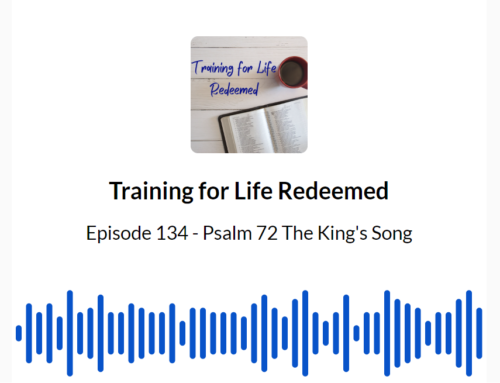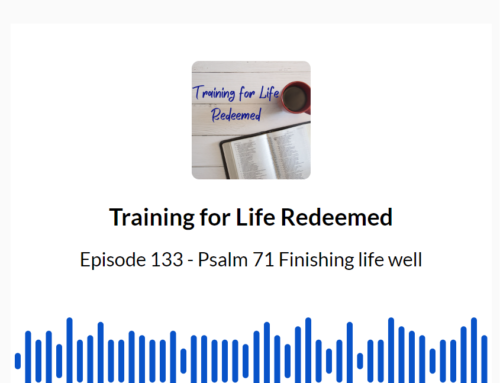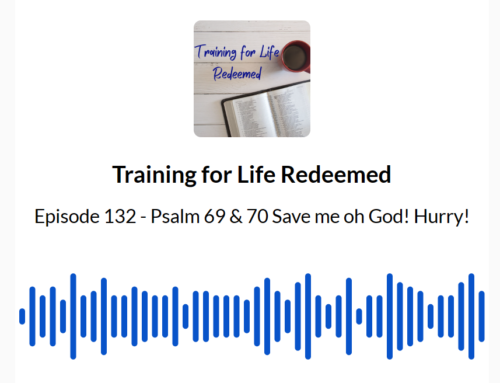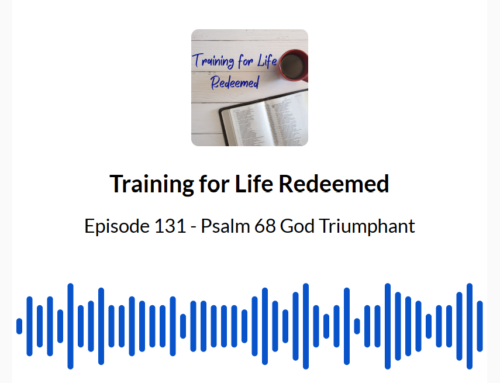Grab your notes for this episode by completing the form
and we will send you the link to all our notes.
God’s residence is also the home of his forever family. It is glorious in its structure and abundant in its productivity. This is the new City of God and Garden of Eden of the future. Royal palaces, and the mansions and estates of the wealthy, are poor substitutes.
Dan: [0:01] Hi everyone, and welcome to Training for Life Redeemed. I’m Dan, I’m here with my father David Jackson. We are continuing to work through the book of Psalms today. Dad, we’re heading into Psalm 65, so why don’t you give us a read of that.
Psalm 65
0 For the director; a composition of David, A song.
1 For you silence is praise, Oh God in Zion;
And a vow will be paid to you in full.
2 Hearer of prayer,
all flesh will come to you.
3 Guilty words overpower me.
You cover our rebellious actions.
4 Happy is the one whom you choose,
and the one you bring near to dwell in your courts.
We are filled with the good things of your holy house, your palace.
5 Fearful in righteousness, you answer us,
God of our salvation.
Secure are all the ends of the earth and the distant seas.
6 The one who establishes mountains in his strength;
The one fitted out in his power;
7 The one who stills the roar of the seas,
The roar of their waves
and the sound of nationalities;
8 And they who dwell at the ends of the earth will fear
because of your signs.
You cause the going forth of the morning and evening to sing out.
9 You visit the earth and you make it abound greatly.
You make it rich.
God’s canal fills with water.
You cause their grain to set, because you set it just so,
10 Saturating its furrow, shaping its trenches.
You soften it with abundant rain.
You bless its shoots.
11 You crown a year with your goodness.
Your tracks spill over with the excess.
12 The pastures of the wilderness overflow
and the hills are surrounded with celebration.
13 The pastures clothe themselves with flocks,
and the valleys cover themselves with grain.
They raise a shout, they even sing.
Well Dad, can you start then by giving us a bit of context for this psalm. It says that it’s a composition of David and there’s some indications within the actual psalm itself as to what context this might relate to. Can you give us a bit of a background of David and where this psalm might fit?
David: [2:16] Well I think our only clues really are that he’s in Zion, so he’s in Jerusalem, on the mountain and he’s talking a lot about how happy he is to be in God’s courts. [2:31] So it would appear this has something to do with bringing the tabernacle up to Jerusalem and when you bring the tabernacle and the ark of the covenant up to Jerusalem, the visible presence of God comes with it. So God is now in residence, the tabernacle is up, David wants to build a temple, but the focus of everything that he’s done is on getting the king and Yahweh in the same place at the same time.
So, it’s finally arrived, and when you look at all of David’s adventures prior to that, between all the enemies he’s chased and Saul and everything else, I think it’s interesting that at the beginning of it, he says, “for you, silence is praise.” And you go, that’s that sense of, you know, you get to the end of the week and on Friday and all the chaos is over, and you just sit down and go, yeah.
Only in this case, David, we have this interesting thing, there’s a reference after David commits adultery with Bathsheba and the baby dies, David has been praying all night and the answer was no. So he gets up, he gets dressed, has a wash, has his breakfast, and he goes and he sits in the tabernacle.
[3:55] So the king is in a place where the priests should be. It seems to, I don’t think he was sitting in the court outside. It looks like he’s sitting there facing the curtain and Yahweh is visibly present on the other side of the curtain and he’s been forgiven of his sin. God said no to his prayer and he’s just sitting there in silence, recovering. There’s a sense of, okay, all that’s all over.
And I think this is a song that you sing when you get to the point where the struggle is over, it’s resolved, I can sit down. I can sit in the presence of God. I don’t have a great list of requests. At this point, he’s answered everything. And so there’s an element here of, you know, he says further down that God answered his prayer and you go, that’s a good place to be.
Dan: [5:02] If this is our kind of context, we have the tabernacle pretty much is definitely in Zion. That’s fairly clear from the context here. Whether it’s as David’s brought it in, or just it’s in there and it’s set up and it’s laid out. He’s at that point in his life where he’s no longer being chased by Saul, he’s established himself as king, the civil war aspect is gone. He’s basically set up his kind of palace too in Jerusalem, because he’s now bringing everything into Zion, or has already brought it into Zion. And it is really that short period for David where there is peace.
And so he’s sitting down, he’s relaxing so to speak, because he’s already been on a lot of the blood conquests: his mission of defeating the Philistines, actually settling the land finally that was given to them. And so I guess now he’s looking into, everything is in order in that kind of sense of peace. And he’s going to start looking then into the blessings that are going to come, right?
The covenant of faithfulness, we’re now at the point where blessings should start to arrive. Yes, yes.
David: [6:12] He says, you know, guilty words, it’s a difficult line to translate in verse 3, guilty words overpower me. The word for words and the word for things is the same word. So, is it guilty words or guilty things have been overpowering me. [6:30] But you cover our rebellious actions. So that whatever the accusations, whatever the slander, whatever troubles he’s been through, whatever guilty things are in view, this word cover is the word we often translate atone. You atone for our rebellious actions, you cover them. They’re gone.
And so happy is the one you choose, the one you bring to dwell in your courts. So God is, it’s not that David has solved all these problems or David has won all these victories. God chose David. And David wasn’t expecting it, neither was anybody else. He chooses the runt of a litter. He brings him through terrible experiences. And through that, everybody can see that it’s God doing this stuff, not this little weedy guy, you know, from some donkey farm down the bush.
Dan and David: [7:26] Sheep, sheep. His father was running donkeys, wasn’t he?
Yeah, he was out looking after the sheep, wasn’t he? He was looking after the sheep. fending them from the wolves, ripping them out of the wolves mouth and the lions mouth. All that sort of stuff. Yeah, not a bad job for a 15 year old. Yeah, no, doing well really. Doing all right.
David: But that idea that, you know, I’m a nobody out in the hills with the sheep and, you know, dad’s got the donkey franchise and the brothers think I’m a somebody you can push around. And one day this crazy man turns up and tips oil on your head and says, you’re the king. And the next thing, knocking Goliath over and all these dramas. And 20 years later, there you are, sitting in God’s house in Jerusalem, and God’s been fulfilling all of these promises. And you go, oh, finally, silence is praise.[8:22] The world is still,
There’s a theme in the Bible, and particularly in the Gospels. [8:28] Where the Messiah, God’s anointed one, silences his enemies.
And you see it, it’s sort of a comedy with Jesus. The Pharisees, the Sadducees, the Herodians, they keep sending teams of people to trap him. And by the time he’s finished with them, they’re all standing there in total silence, they’ve got nothing left to say. And they all creep away into the bush or back into their office to plot more things.
But there’s this, it’s over, that real wonderful sense of it’s over. And you have brought this nobody to sit in your house, your palace, that’s a great place to be and to sing.
Dan: Yeah, and you talked there about that theme of silence, which then kind of gets continued throughout the psalm here when it talks about the signs that Jesus, well, what is Jesus going to do? But I was really, I was always straight to Jesus with the signs that he does. But then also, you know, also looking back to the signs that he’s done with Egypt and the signs he did as Joshua brought them in, the signs that he’s done the whole way through. But also the ones that, we read this now, thinking of the more recent ones with Jesus and that. But we also have, we’ve got stilling waters, we’ve got this whole idea of settling things, establishing things the way that they’re meant to be. And the seas obviously take on more of a role than just being the sea. [9:57] They are linked to creation, They’re linked to chaos. They’re linked to all kinds of stuff. And so, the idea that God calms the seas and sets things up.
David: You start off back in, is it Psalm 2, why do the nations rage? Yeah. And it’s this word for the ocean roaring and raging, and the nations are doing that, and they’re tearing each other to shreds. And you watch the news, and there they are, tearing each other to shreds. [10:24] And here he is saying, they’re all out there doing all of that, and you bring…[10:31] You silence the whole thing.
The language of the Psalms, one of the great, you know, people argue about is Jesus God. One of the things that Yahweh does in the Old Testament is he is the one who brings the roar of the ocean and the seas and all the threat that that is, and he stills the whole thing. And Jesus stands in a boat and does exactly the same thing. And if you know your Bible, Jesus is standing there saying, guess who I am? You know, here’s a sign. Can you read the sign? I’m holding up a sign. It says, I still seas. I stop the roaring wind. Who am I?
And that’s what this song is teaching us. Teaching us to look for that sign.
Dan: Yeah. Hint the answers in the question.
David: [11:26] And you go, how many times has this got to happen before people read the sign.
Dan: Yeah, so, we then move on to the blessings that are to come, and these are blessings that David’s expecting, just a covenant that’s established between God and Israel, and obviously for us, at this point in creation, we’re looking forward to a new creation, to heaven and being on earth, all that kind of stuff, and some of the stuff that’s in here, it talks about the pastures being covered, clothed with flocks, but also covered in grain as well. Oh, well like, those things don’t go together. [12:04] You overpopulate an area, you kill all the animals, and there’s no food for them.
David: But in Israel it works because, so the language in here, this is poetic language about farming, and so saturating the furrows and shaping its trenches and softening it with rain and blessing its shoots and all these wonderful pictures, God promised Israel that he would put them in a land, the promised land, the land of milk and honey.
[12:34] He is restoring Eden. He kicked us out of Eden, that was God’s place to be with his people, kicked us out of there when we told him we could do a better job. Off you go, do a better job. See where that ends up.
And so now that he’s made all these promises to bring us back to this Eden, and he’s describing it. One of the little clues here is the land of milk and honey, Milk is dairy country, honey is, you think, flowers, but it’s also date palm sugar, so it’s the sweet stuff. [13:14] It’s not actually what we call honey, it’s the sweet stuff.
Well, the sweet stuff grows on the east side of the ridge going down the middle of Israel, and the dairy country’s on the west, or up in the north in the land of Bashan. So God is going to give him this area that’s, you know, brilliant coastal rolling hills, like, you know, Bega and Kiama on one side.
Dan: Yep, very green, lush, beautiful place.
David: And then the other side is sheep country.
Dan: Yeah, not much else to live there. Sheep and goats. Sheep and goats, that’s right.
Dan: And if you’re in Australia, think like going out west near Broken Hill and that’s the one. When you start hitting the, what’s it called, the Neva, like where that’s all sharp rocks and no plants. Yeah, that kind of stuff.
David: But that sort of landscape is east of the ridge in Israel, just like it is west of the Blue Mountains. [14:04] So you’ve got that distinction. And here he is, you’ve got the grain, you’ve got the flocks, you’ve got both sides of the ridge, and it’s all happening. And he describes this as your tracks spill over with excess. So wherever you go, wherever God’s people go with God, It’s like everything suddenly is overgrown and the excess is going. This is, the pasture clothes, the pastures clothe themselves with flocks. You’ve got so much grain, you’ve got to run the sheep out there quick and bring it down.
[14:47] This is a scene of abundant blessing. And if you read the history of Israel, There are a couple of periods where something like this happened, but really and truly we’re still waiting for those promises.
Earlier on, he was talking about all the ends of the earth will fear because of your signs. And this is that line that the gospel is going to go out to the ends of the earth, and at the ends of the earth, the nations are going to come. They’re going to want to be in this palace. They’re going to want to be in this land. They’re going to see the signs of God’s grace. And so Isaiah takes something like that and he turns it into those beautiful pictures of the new creation and then when we get to Revelation the whole thing explodes.
So this is a song that’s taking us from David’s little moment of ah, to looking forward to where that ah is going to get a whole lot bigger.
Dan: [15:50] Well dad that brings us to the end of this episode. If you would like to come and grab the study notes to go along with this episode, go deeper into this and have a look at a bit more of the context and all that kind of stuff, you You can come to trainingforliferedeemed.com/128.
[16:05] You can subscribe there and get access to the study notes. You can also watch the video and all that kind of stuff there as well.
And otherwise, make sure you hit the subscribe button. Come back and join us next week. Next week I think is our last episode Dad for the year.
Possibly. Is that right? Yeah. Well, we’ll find out. I don’t know. I just come along and do all the bits and pieces.
All right. We’ll see you next week. See you next week.



